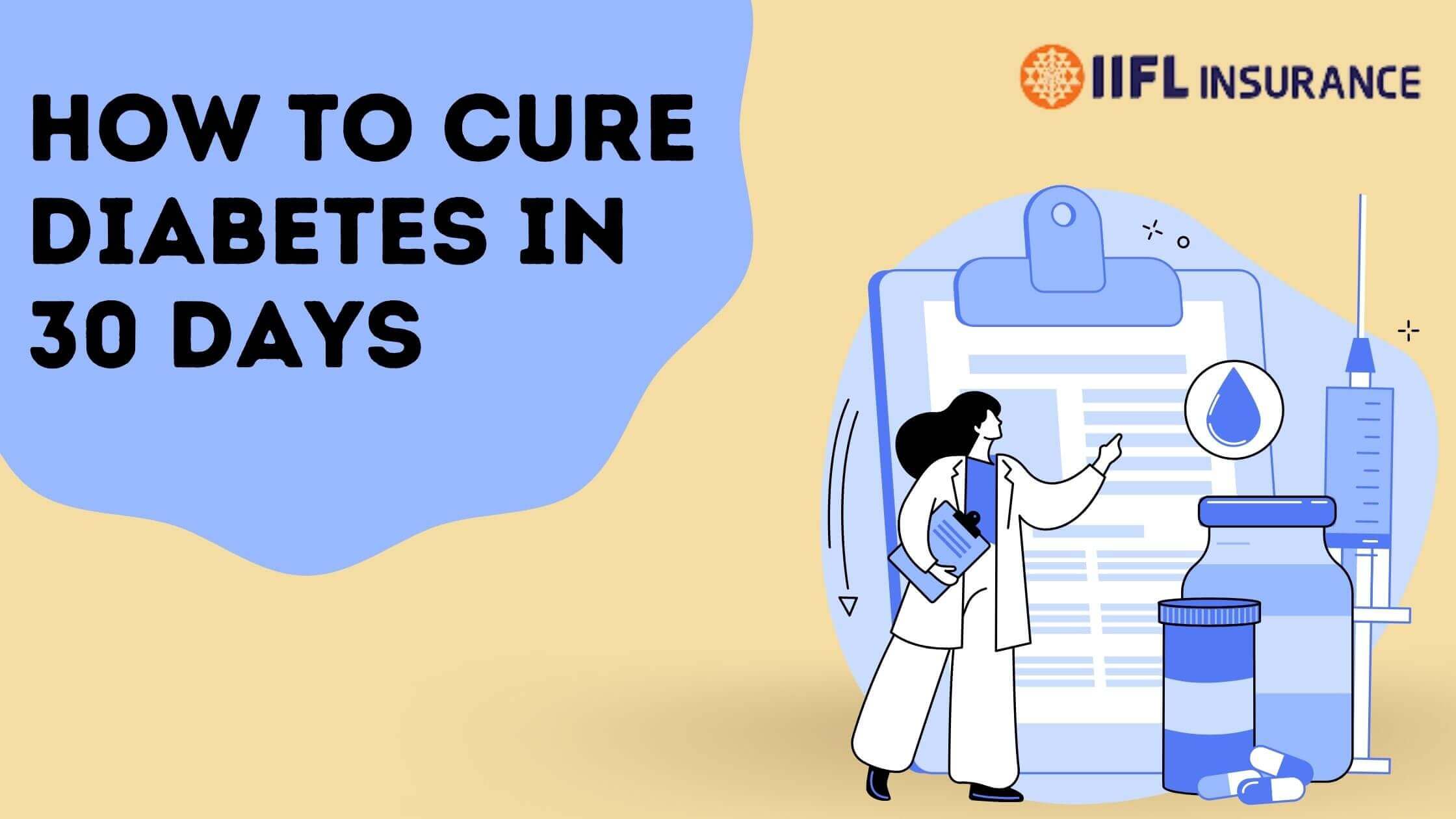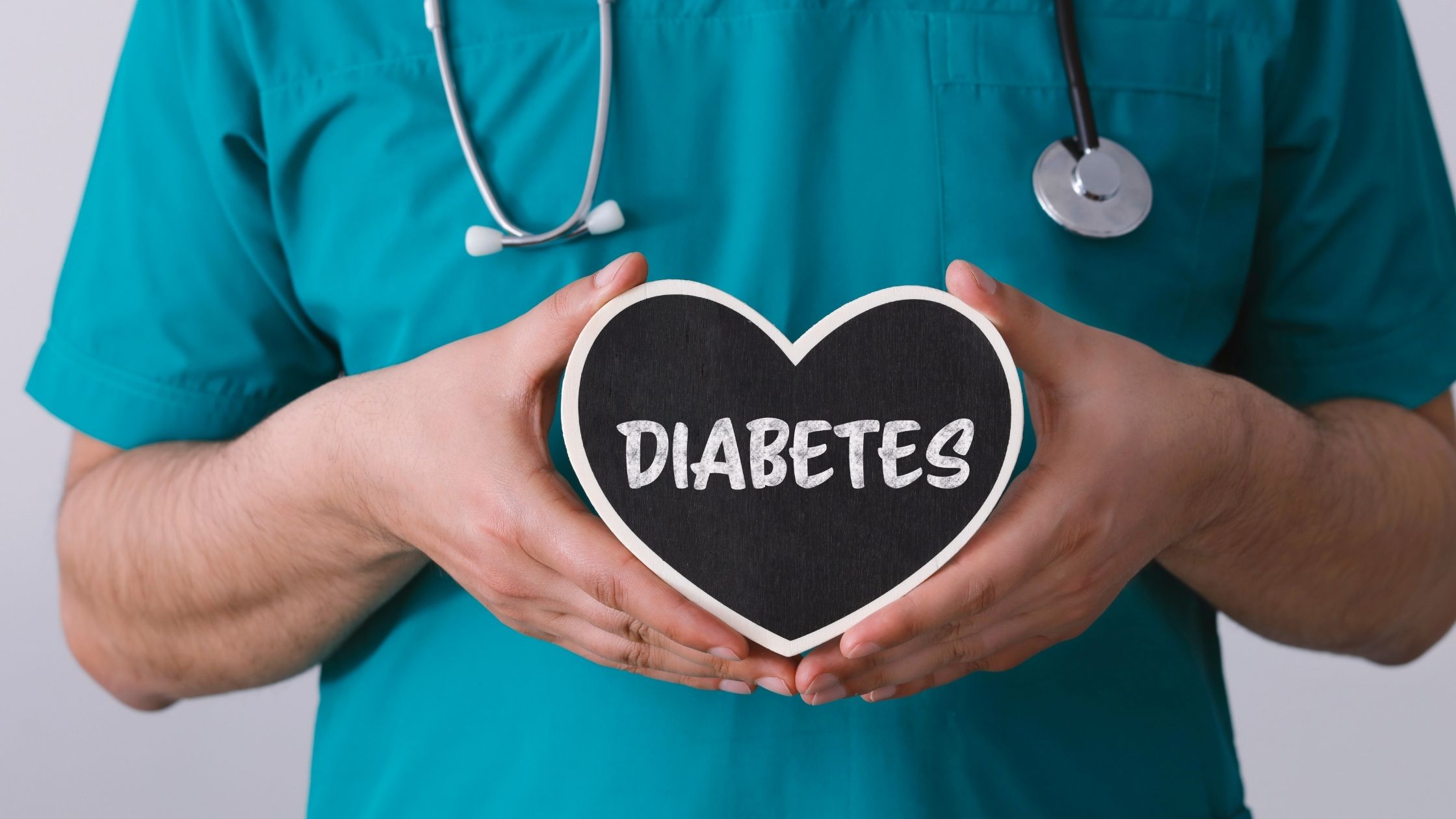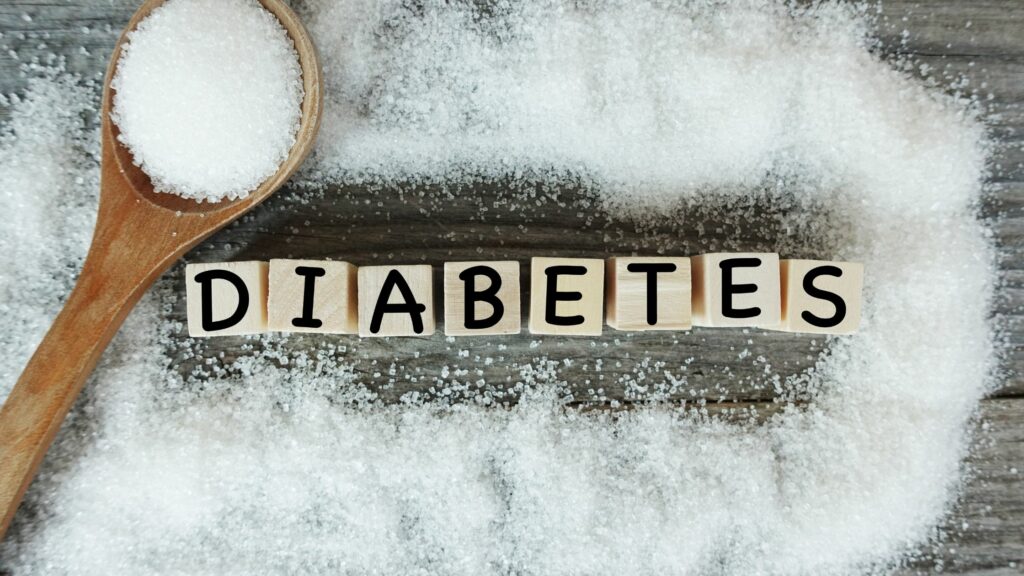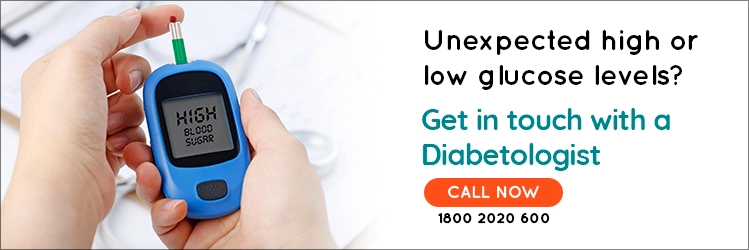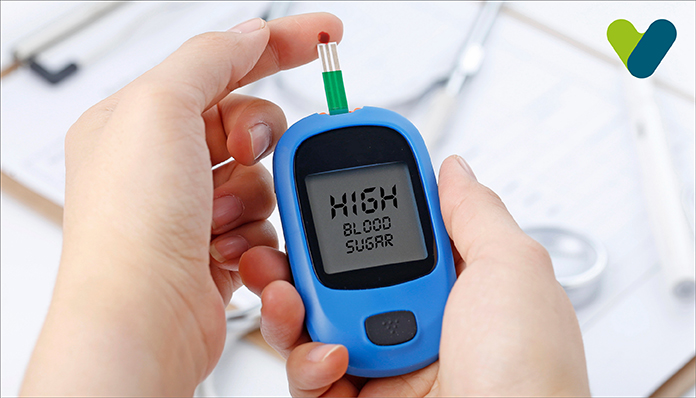One of the most commonly researched terms on the internet is
“how to reverse diabetes in 30 days,”
Although nobody can tell you how to cure diabetes in 30 days, we can certainly tell you
how to reverse or control diabetes naturally in 30 days.
Before we dive in to see how to reverse diabetes in 30 days, let’s skim through the basics of diabetes. Diabetes is a group of disorders that have an effect on the way one's body utilises blood glucose or blood sugar. Glucose is crucial for the tissues and muscles that make up the body, as it serves as a primary energy source. Additionally, it is the main source of fuel for the brain. The main reason for diabetes varies based on its type; however, irrespective of the diabetes type that you suffer from, it can result in a high
level of glucose in your bloodstream
. An excessive amount of glucose in the blood may lead to major health complications. Diabetes types 1 and type 2 are both long-term diabetic diseases. Diabetes types that may be reversible include gestational diabetes and prediabetes.
may occur during pregnancy and may disappear after the delivery of the child. Prediabetes is a condition where the blood sugar levels raise but do not elevate enough to categorise the condition as diabetes. The following are a few of the signs and symptoms of both type 1 and type 2 diabetes:
With time, poorly managed high blood glucose levels cause complications such as:
Keep reading for to know the steps that you may be able to take to reduce your risk of developing the above-mentioned diabetes-related health issues with diet and lifestyle changes; however, before that, let us know whether diabetes is curable:
Is Cure for Diabetes is a Myth?
Almost nobody can tell you
how to cure diabetes in 30 days
or even 60 days or even 365 days because, unfortunately, there is no cure for diabetes (although one google search will demonstrate that people will try!) Please don't fall for it because science has not yet developed a treatment. However, the good news is that there are several ways and means to control or reverse diabetes, or in other words, to reach and maintain normal blood sugar levels. Moreover, not every diabetic needs medication.
That means that one can live an everyday life despite suffering from diabetes with a few adjustments to diet and lifestyle, corresponding with a more healthy way of living. Nothing especially dire - simple adjustments and a little health consciousness go a long way. And clearly, you are making a definitive first step by doing your research. There is a hopeful guide on bookshelves on curing diabetes in 30 days titled
The 30 Days Diabetes Cure, by Dr. Ripich
. However, in the said book, the diabetic individual is guided through diet and lifestyle changes that reverse their blood sugar levels to normalcy, returning them to their initial state if they cannot maintain the diet and lifestyle changes.
Going from "How to Cure Diabetes in 30 Days" to "How to Control Diabetes for Life"
A slight shift in mindset is required, which will make your progress much quicker and much faster. Adjust to the idea that you cannot make your diabetes go away (much like you might not be able to make an annoying neighbour - or mother-in-law - go away). However, you can keep it from disrupting your life by making a few minor changes (in the same way as you might make some minor changes to appease your mother-in-law or annoying neighbour). Your diabetes need not bother you at all, even if you live to eat. It would help if you ate right. Here are a few lifestyle modifications you can implement that may have a big impact on your diabetes management.
Minor Lifestyle Adjustments That Can Make a Significant Impact
1 Foods with a low GI:
The glycaemic index, also known as the GI, is utilised to assess how fast carbohydrates break down and are absorbed by your body during the process of digestion. The rate at which the sugar levels in your blood rise is affected by this. The glycaemic index ranges from 1 to 100, where goods with a low ability to impact blood sugar levels rate low and foods with a high capacity to affect blood sugar rate high. Controlling your blood sugar is not about avoiding “sweet” beverages and foodstuffs but avoiding foods with a high glycaemic index. Both the type and amount of carbohydrates you consume influence the way food impacts the levels of your blood sugar. Low GI meals, in particular, have been demonstrated to lower the level of blood sugar in diabetics. Some options for foods having a low to moderate glycaemic index are as follows:
Furthermore, including healthier fats or proteins in diet helps reduce the spikes of blood sugar following a meal.
2 Replace processed meats:
If you are a meat lover, you need not become a vegetarian overnight because of your diabetes. Unless you have religious or other reasons for giving up a non-vegetarian diet, you can replace processed meat with fatty fish and eggs for a delicious yet healthy non-vegetarian protein component in your meals. Some examples of fatty fish include mackerel, sardines, and salmon, all available across India. Moreover, a recent study revealed that nitrites and nitrates that are commonly found in processed meats can be linked to an increased likelihood of diabetes type 2.
3 Control carbohydrate intake: The intake of carbohydrates has a noteworthy effect on blood sugar levels. The body breaks down carbohydrates into sugars, mainly glucose, which is then utilised and stored for energy with the help of hormone insulin; however, if one consumes too many carbohydrates or has difficulties with insulin function, this process may fail, leading to elevated blood glucose levels. Studies have also found that following a diet with low carbs helps lower the blood sugar level and avoid blood glucose spikes. You may continue to consume some carbohydrates while monitoring your blood glucose; however, choosing whole grains rather than processed and refined carbohydrates gives greater health benefits while reducing your blood sugar levels.
4 Smarter breakfasts: For people with diabetes, eggs are an excellent
protein-packed breakfast option
because you need to compulsorily avoid fruit juices and breakfast cereal, both of which are otherwise stapled breakfast options. Vegetarians who are not eggitarians can alternatively look at consuming flax seeds, walnuts, whole fruits, and Greek yoghurt among options for a healthy breakfast that would be part of any "how to cure diabetes in 30 days" claims. In moderation, peanuts - which have a relatively low glycaemic index of 14 - can also be included. Chia seeds are also a good option for people with diabetes to consider.
5 Watch your grains: This one is short and straightforward: Refined grains such as rice, white bread, and pasta send blood sugar levels spiralling and should be replaced with their whole-grain counterparts. The intake of carbohydrates has a noteworthy effect on blood sugar levels. The body breaks down carbohydrates into sugars, mainly glucose, which is then utilised and stored for energy with the help of hormone insulin; however, if one consumes too many carbohydrates or has difficulties with insulin function, this process may fail, leading to elevated blood glucose levels. Studies have also found that following a diet with low carbs helps lower the blood sugar level and avoid blood glucose spikes. You may continue to consume some carbohydrates while monitoring your blood glucose; however, choosing whole grains rather than processed and refined carbohydrates gives greater health benefits while reducing your blood sugar levels.
6 A few simple rules about sugar: When you juice a fruit, it loses the fibre required to stabilize blood sugar levels, which could cause a spike in blood sugar. Fresh fruits correspond to healthy eating, but fruit juices do not. Tea and coffee, sodas/all those delicious fizzies, alcohol, and candy contain concentrated amounts of sugar and must be avoided. When you need something refreshing, go for greek yoghurt or a chilled avocado, water, black coffee, or unsweetened tea. And yes, you can drink a club soda (because it is just carbonated water) but not cola and most other fizzies.
7 Healthy snack on frequently: Seeds, nuts, beans (or all three together), green leafy salads (made tastier with nuts and beans), zucchini and avocado sandwiches, broccoli, and strawberries are some readily available items that you could consider. All of these are good for you in terms of controlling your blood sugar levels. However, always consume anything and everything in moderation – this is a blanket rule for diabetes. Moreover, spacing out your snacks and meals through the day can help you avoid both low and high blood sugar levels. Snacking between your meals may also help you lower the likelihood of developing type 2 diabetes. Several studies have found that eating more frequently and in smaller amounts throughout the day may improve the sensitivity of insulin and reduce blood sugar levels than eating less frequently and in large quantities. Furthermore, consuming small meals and healthy snacks throughout the day may reduce glycated haemoglobin (HbA1c) levels, showing blood sugar level improvements over a time of several months.
8 Flavour alternatives to deep-frying: When you have diabetes, yes, you need to avoid deep-fried foods. However, you can add a burst of flavour to your meals by using apple cider vinegar, extra virgin olive oil, garlic, and the seeds and nuts we talked about earlier
9 Do physical exercise regularly: Regular physical activity can help you stay at an optimal body weight as well as improve your sensitivity to insulin. An increased insulin sensitivity implies that the cells can utilise the available glucose in your circulation effectively. Exercise also aids in the use of blood glucose levels for muscular contraction and energy. If you struggle with blood sugar control, consider testing your levels prior to and following exercise on a regular basis. This will allow you to find out how you react to various activities while keeping the levels of sugar in your blood from becoming too high or low.
10 Cut down on alcohol: Alcohol can significantly raise your blood sugar levels and cause liver toxicity. According to a study, excessive alcohol intake, defined as more than three drinks a day, can be related to a 43% higher incidence of diabetes. Beer and sweet liquors, in particular, are heavy in carbs and should therefore be avoided.
11 Try to control stress levels: Stress can impact blood sugar levels as the body produces cortisol and glucagon, chemicals that raise blood sugar levels, in response to stress. A study conducted on a group of students revealed that practicing meditation, relaxation, and exercise significantly reduces their stress levels and blood glucose levels. For individuals with chronic diabetes and insulin secretion issues, techniques such as yoga and mindfulness relaxation may be beneficial in managing the condition.
12 Maintain a healthy weight A healthy weight promotes good blood sugar levels and lowers the likelihood of getting diabetes. According to research, even a 5% weight loss may improve the regulation of blood sugar and minimise the need for diabetic medication
13 Consume probiotic-rich foods: Probiotics are beneficial bacteria that have been shown to help regulate blood glucose levels. In studies, probiotic use has been shown to reduce fasting blood sugar, insulin resistance, and glycated haemoglobin in individuals with type 2 diabetes. Probiotic foods may include: • Yogurt • Kimchi • Kefir
Conclusion
When you think about
how to cure diabetes in 30 days
, you probably picture a very fierce and unpleasant 30 days following which you go back to living the way you did earlier, never having to think about diabetes again. That sounds unpleasant in its way. Considering that there is no such option, people with diabetes should adopt a positive mindset and aim to control their diabetes calmly, consciously, and with little self-control.
- Is there a cure for diabetes?. Diabetes UK [Internet]. https://www.diabetes.org.uk/diabetes-the-basics/is-there-a-cure .Accessed April. 20, 2023.
- Can You Reverse Type 2 Diabetes?. WebMD[Internet]. https://www.webmd.com/diabetes/can-you-reverse-type-2-diabetes .Accessed April 22, 2023.
- Is There a Cure for Type 1 Diabetes?. Diabetes Research Institute Foundation[Internet]. https://diabetesresearch.org/type-1-diabetes-cure/ .Accessed April 22, 2023.
- The future of diabetes treatment: Is a cure possible?. Labiotech UG [Internet]. https://www.labiotech.eu/in-depth/diabetes-treatment-cure-review/ .Accessed April. 24, 2023.
